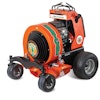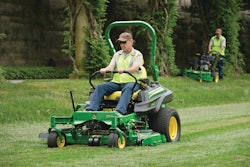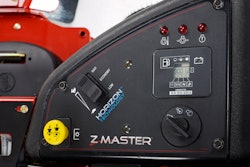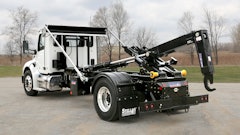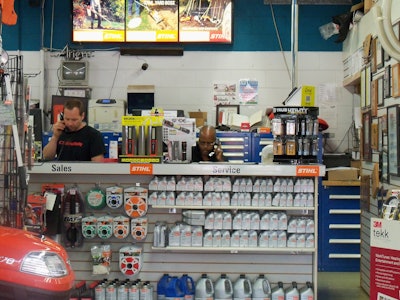
Service Writers are responsible for the direct interaction with the customer. A Service Writer who makes successful assessments and scheduling doesn’t only benefit the customer, but also saves the time of technicians. While not all Service Writers may have the experience of technicians, setting up a general list of questions to ask for popular products like riding and push mowers, chainsaws, string trimmers and leaf blowers can assist your service department in increasing efficiency and customer satisfaction.
When customers visit a service department and leave without fully explaining the issues they’re having, their equipment often goes straight to the back of the line, which causes frustration for the customer and can also be a waste of time for technicians. When a lawn care professional is faced with a two- to three-week wait time before their equipment can even be assessed by a busy technician, that lawn care pro is losing business. Residential customers who also need their equipment to maintain their own properties many times get frustrated and write negative reviews.
According to Bob Clements—who is the president of Bob Clements International, a consulting firm that specializes in the development of high-performance dealerships—Service Writers, when effective, can raise the overall efficiency of a service department. “A Service Writer is such an important role in the service department because it would be like if you were a patient walking into a doctor’s office and the first person you met was the doctor instead of a nurse who took your blood pressure and your pulse. A doctor would be spending a lot of time doing unnecessary things. So a Service Writer really saves service technicians a lot of time if they do their job right.”
The cost of “surprise” pricing
Another reason for training and operating with effective Service Writers is because they often are the ones who provide the customer with a price estimate.
If the repair ends up being something costly or unmanageable, you’ve got an irate customer on your hands who realizes they’ll need to buy a new piece of equipment. It’s unlikely that they’ll be looking to purchase from your dealership if they feel you’ve wasted their time. “Our rule of thumb in the service departments we consult with is if an estimated repair will exceed over 50% of the current value of the equipment, you should encourage the customer to replace, not repair, the unit. Some customers have a sentimental attachment to their equipment and won’t care about the cost of the repair, but most will thank the Service Writer for their honesty and look at a new unit at the dealership,” says Clements.
Pete Meenk owns and operates Mowers and Blowers, a mobile small engine repair service that operates in the suburbs of Milwaukee, WI. He says he’s frank with customers about fixing handheld equipment like string trimmers. “With hundred-dollar equipment, we still have a $75 minimum for service. So if a customer wants to bring me out there to look at a trimmer, that’s up to them. But I’ll usually steer them and explain that it's throw-away equipment, and that they should look at how long they've had it and consider if they want to buy something new.” Meenk says he’ll then recommend a higher-end brand that shouldn't run into as many service issues.
Figuring out the issue
While many times it’s hard to identify what’s wrong with a piece of equipment if the customer just comes in and says, “Well I don’t know, it just doesn’t start”, there are easy ways to help identify potential problems by using follow-up questions.
“We encourage all Service Writers to create a list of questions that flow from a general statement that a customer might give to a more specific question that will help the customer narrow their focus. As an example, if a customer brings in a piece of equipment and tells the Service Writer that it ‘doesn’t run’, the Service Writer should then ask, ‘Do you mean it doesn’t stay running or it doesn’t start?’ If the customer says it starts but won’t stay running, then the Service Writer's next question should be, ‘about how long does it run before it stops?’ If the customer says 20 minutes and then it stops, that tells me something different than if they say it will only run for a few seconds,” says Clements.
Balancing motivation with efficiency. Clements advises that Service Writers be included in service department’s bonuses when they assist the department in functioning at its most efficient level. This way, even if faced with a long line of customers, the Service Writers are going to take the time to ask all the important questions. He also sets them up with a printed set of questions in the beginning. According to Clements, the questions should be so clear-cut that even a 15-year-old could check in a piece of equipment.
In the case of Meenk at Mowers and Blowers, asking the right questions up front gives him a good idea what he’s heading out to. He has the challenge of not being able to see the actual equipment; his scheduling is done either by phone or internet. “I just ask them to best describe what type of machine they have, and based on experience I can kind of know what I’m dealing with that way. Then I ask them what the direct symptoms are, such as no wheel drive or won't start, and try and whittle it down that way. Then I’ll ask them under what circumstances did they experience this symptom. Was it while in use, when turning it off, or did they use it once and now they came back and had that symptom? I’ll also ask how long it has been going on and when the machine first started not operating like it should.”
Timing is essential
One of the top complaints against a service department is the long wait time, coupled with an unexpectedly high repair estimate once the piece of equipment is finally diagnosed. When customers are told by Service Writers that the shop is backed up three to four weeks, they can get frustrated. Equally frustrating for customers is when they leave their equipment at a service department for that amount of time and then receive a call with a laundry list of things that need to be replaced, and are stuck with a bill that was much higher than they expected. These experiences don’t generate loyal customers.
Clements strives to take service department efficiency to the next level. The service departments he works with focus on professional customers first, right from the get go. He even implements a separate line for professionals so the Service Writer notices them right off the bat.
“Professionals know their equipment so they are very quick to check in, whereas a consumer might not know a lot about their equipment, so we’ll have to spend a little more time with them,” Clements explains. “In our shops, our commercial professionals always have priority. So if there are three people in line and a commercial customer comes in, they have priority. So we would say to the customer, we have a commercial customer that just came in so let me help them real quick because they’re making money mowing and we’ll get right back to you guys.”
Tips for diagnosing common products
Mowers. Clements recommends that you start off with some general questions, i.e. does it start, does it run, does it make a noise, where specifically does this noise come from? If the customer says, "Well it’s coming from the deck," that does help narrow it down. Continue advancing the conversation. You can ask, "Does it make the noise all the time or just when the deck is run, and what side does it make it from?"
"If the customer says 'It just doesn’t run,' that doesn’t tell me anything," Clements reminds. "I need to know under what conditions that it doesn’t run."
Chainsaw. According to Eddie Anderson, technical training supervisor at Stihl, the Service Writer should check that the unit has compression and is not locked up by doing the rope pull test.
String Trimmers and Leaf Blowers. Fred Wright, of Wright’s Small Engine Service in Rochester, MN, has tips on evaluating whether handheld equipment should be fixed. “The main question we start out with is whether or not your gas is fresh and within 30 days old? Then take the customer outside and see if they know how to run it. Sometimes we see that people don’t know how to start it correctly; we see they have it flooded or they don’t have it turned on.” If it does turn on, Wright says he explains the cost of repair vs. a new piece of equipment.




